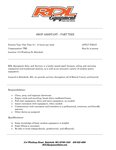Mass Department of Elementary and Secondary Education & Department of Public Health Frequently Asked Questions
August 20, 2021
1. Where can districts find information on purchasing air purifiers? Last year DESE purchased the Medify MA-40 HEPA air purifier units from Safe Ware Inc. Inventory of this product is available under the state contract HLS06. The cost is $258.82 per unit. Other options available on the state contract for air purifiers include the following: FAC85, FAC100, FAC101, FAC105, and HSP41. If you have any questions, please feel free to contact Anne Marie Stronach at anne.marie.stronach@mass.gov; 781-873-9514.
2. Do individuals need to maintain physical distance in school this year? There are no physical distancing requirements in place this year, even during meals. However, we recommend that districts and schools encourage individuals to distance as feasible when masks are removed indoors during mealtimes. Schools are also encouraged to continue utilizing outdoor space for meals, as feasible.
3. Do individuals need to maintain physical distance while participating in Test and Stay? The Test and Stay program allows asymptomatic close contacts to remain in school, as opposed to quarantining at home. This program includes daily testing and masking at all times. For only these individuals in Test and Stay, DESE recommends a physical distance of at least 3 feet during meals, when masks are removed.
4. Are clubs, activities, and electives (e.g., chorus/band and physical education) allowed indoors? Currently, there are no restrictions on indoor activities. Schools are encouraged to maintain distance between individuals as feasible or use outdoor space. For further guidance/support in planning clubs, activities, and electives, call DESE’s Rapid Response Center at 781-3383500.
5. Can students who are quarantining due to a COVID-19 related issue participate in remote learning? During the 2021-22 school year, full-time remote learning programs will not count toward structured learning time hours unless specifically previously authorized by DESE.
Only in the limited instance where students are isolating and/or quarantining, as described in the SY22 protocols issued by DESE and DPH, if schools have the ability to allow students to join their schedule remotely, then they may do so. Consistent with DESE’s guidance on student attendance, quarantining students who participate in at least half of the school day activities can be marked present.
If schools are not able to allow students to join their schedule remotely, schools should adopt a policy consistent with other absences and provide work for students that can be completed while at home. To minimize the amount of time required to quarantine outside of school districts should adopt the Test and Stay program. More information about this program can be found here: https://www.doe.mass.edu/covid19/testing/.
6. What is the school’s obligation to provide home or hospital services to students who are medically unable to attend school in person? Some students are unable to attend school due to a documented, longer-term medical need. Upon receipt of a physician's written order verifying that a student enrolled in a public school or placed by the public school in a private setting must remain at home or in a hospital on a day or overnight basis, or any combination of both, for medical reasons and for a period of not less than fourteen school days in any school year, the principal shall arrange for provision of educational services to provide the student with the opportunity to make educational progress even when a physician determines that the student is physically unable to attend school.
Please note that home and hospital services apply only to students with documented medical needs. To learn more about home and hospital services, please read the Question and Answer Guide on the Implementation of Educational Services in the Home or Hospital (download) and review the physician affirmation forms here. For additional questions, please email specialeducation@doe.mass.edu.
7. Do schools need to maintain a dedicated medical waiting room? No, schools do not need to maintain a dedicated medical waiting room. If an individual is symptomatic on the bus or at school or tests positive for COVID-19 while at school, they must be masked, and when feasible, be in a separate room with the door closed. If a separate room is not available, they must adhere to strict 6 feet of physical distancing until they can go home. Information for School Health offices can be found https://www.mass.gov/doc/information-for-school-health-offices/download.
8. Can individuals identified as a close contact while at home (i.e., non-school based close contact) return to school and participate in the Test and Stay program? The Test and Stay program is intended for school-based close contacts, only. Individuals identified as a close contact of an individual outside of school should follow Protocol B-2 or B-3 in the SY22 DESE/DPH Protocols for Responding to COVID-19 Scenarios.
9. Can an individual who is identified as a close contact still participate in sports and extracurricular activities? Asymptomatic close contacts will follow Protocol B: Protocol for asymptomatic close contacts. For school-sponsored events and sports that take place on non-school days, testing is necessary on those days for close contacts to participate. If these close contacts do not consent to testing, or if testing is not available, individuals may not participate.
10. How many days will an individual be tested during the Test & Stay program? The duration of the Test and Stay program is 7 days from the date of exposure. Some of these days could be non-school days (i.e., weekends or holidays). Testing is only required on school days, unless the individual participates in school-sponsored sports or extracurricular activities that fall on a non-school day (see question 8, above). If the 7th day falls over a nonschool day, the individual must be tested on the morning of their return to school. On the 8th day, a student will exit the Test and Stay protocol, assuming all tests were negative, and they remain asymptomatic.
11. Can the school committee or executive board set additional policies beyond what is outlined in these guidance documents? School committees and executive boards may set additional policies beyond those provided in the guidance so long as those policies meet the minimum structured learning time requirements for schools and districts and do not impede students’ access and right to public education.
12. Is the DESE/DPH guidance for districts/schools or for individuals (i.e., parent/student choice)? In general, DESE/DPH’s guidance is issued to districts and schools, with the intent to inform local decision-making and policy development. Parents and guardians should refer to the policies of their child’s local school district when planning for the upcoming school year. 13. Can school health professionals check an individual’s COVID-19 vaccine status in the Massachusetts Immunization Information System (MIIS)? In general, school health professionals who are authorized users of the MIIS can check MIIS to confirm adequate up to date immunizations, avoid unnecessary immunizations, control disease outbreaks or as otherwise needed to confirm compliance with immunization requirements. Authorized school health professionals may check the COVID-19 vaccination status of any individual in MIIS for those purposes regardless of whether vaccines are mandated.


















Comments
No comments on this item Please log in to comment by clicking here